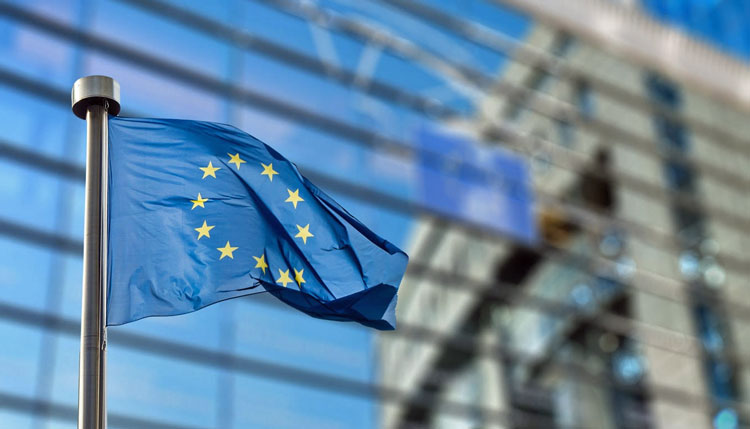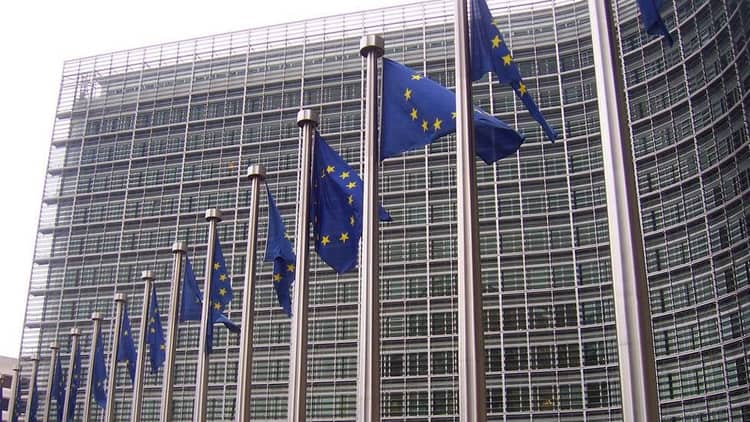The Diplomat
The Council of the European Union confirmed yesterday that has received the Spanish government’s request for Catalan, Basque and Galician to be recognised as official languages of the Union and is already studying the request.
According to the Minister of Foreign Ministry, José Manuel Albares, the initiative comes as a result of the agreement reached with Junts per Catalunya, Carles Puigdemont’s party, to support the candidacy of the Socialist Francina Armengol to preside over the Lower House.
Albares explained that he has sent a letter in his capacity as Foreign Minister to both the Presidency of the Council of the EU, which is held by Spain until 31 December, with a copy to the Secretary General of the Council, Thérèse Blanchet, to request the modification of the regulation that “regulates the language regime so that the languages already co-official in Spain are included as official languages”. European sources confirmed to Europa Press that the European Council has received the letter from the Spanish government and will study it.
According to Albares, the fact that the Council is chaired by “the same state that is requesting it does not represent any anomaly” and this is what the legal services of the Commission and the Council, which the Government has consulted beforehand, have told him.
The minister defended the moment chosen by the government to make this request. “This is part of the agreement reached with Junts and has been sent on the day it was considered appropriate, which is the day the legislature begins”, he said.
Almost a year ago the government asked the European Parliament to allow the use of co-official languages in plenary sessions under an agreement to protect the Catalan language reached at the dialogue table with the Generalitat. At the time, EU sources warned that a request to the Council was necessary for this to be feasible.
Albares stated that Catalan, Basque and Galician “were already used by administrative agreement in practically all European institutions”, with the exception of the European Parliament, and “there was already a right of petition by citizens and the use of these languages in some institutions, such as the Committee of the Regions”.
He also indicated that Spain will ask for this issue to be included as an agenda item at the General Affairs Council (GAC) meeting on 19 September, and acknowledged that the EU treaties stipulate that “the language regime is decided unanimously”.
The inclusion of the three languages will go to the aforementioned GAC meeting, as Spain has met the deadlines of the Council’s regulations, according to diplomatic sources, which means that European ministers will take a position on the proposal in September.
The regulation governing the language regime dates back to 1958 and has been amended with the successive enlargements of the EU, going from four official languages at first – Dutch, French, German and Italian – to the current 24: Bulgarian, Croatian, Czech, Danish, Dutch, English, Estonian, Finnish, French, German, Greek, Hungarian, Irish, Italian, Latvian, Lithuanian, Maltese, Polish, Portuguese, Romanian, Slovak, Slovenian, Spanish, Swedish and Dutch.
The last language to join was Croatian in 2013, with the country’s entry into the EU, while Gaelic is the only co-official language to have been recognised among the EU’s official languages to date. Its inclusion took place after Ireland’s entry into the bloc in 1973, making it the most similar case to the one Spain now has with Catalan, Basque and Galician.
The Gaelic language was formally granted official and working language status in the EU in 2007, two years after Dublin requested it, although exceptions and a transitional period were maintained due to a lack of technical resources, and not all EU records and legal documents were translated until 2022.
The government’s request coincides with the agreement reached with Junts to allow a Socialist to preside over the Congress of Deputies, and which the party of the fugitive Puigdemont disassociates from the negotiations for a possible investiture of Sánchez. One of the demands that JxCat set in order to support Armengol was the request for the recognition of Catalan as an official language of the European Union, which the acting government of Sánchez has also extended to Basque and Galician.
Junts also demanded that the co-official languages of the state be used “with full normality” in the Congress of Deputies.
Catalan is spoken in three Spanish regions: Catalonia, Valencia and the Balearic Islands (east), while Euskera (Basque) is spoken in the Basque Country and parts of Navarre (north) and Galician in Galicia (northwest).







